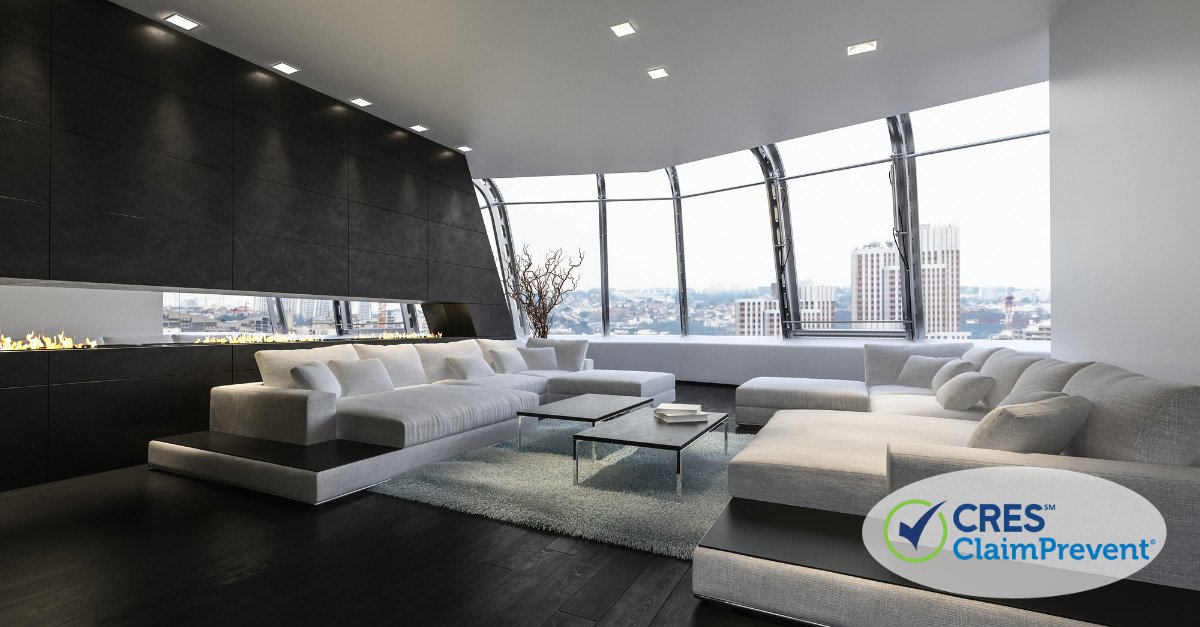Penthouse apartments sound sexy and exciting, but they present a unique set of risks that real estate licensees need to navigate carefully if selling or renting them. This blog will shed some light on the potential pitfalls of selling or renting penthouses. From rooftop amenities and HVAC to weather vulnerabilities, we’ll cover what you need to know about dealing with these luxurious properties from a risk perspective. It’s important to understand the risks so you can protect your clients, prospective buyers and tenants, and your own real estate business.
Understanding the Hidden Risks of Penthouse Living
Proximity to Machinery & Equipment
Penthouses often have machinery, equipment, electrical panels, an elevator room, or HVAC systems nearby. This essential equipment might run 24 hours a day, 7 days a week, causing noise disturbances, and affecting a penthouse resident’s quality of life. Real estate licensees must inform potential buyers or renters about any of these factors so they can make an informed decision. Failure to do so could result in an unhappy buyer once they move into the property and a lawsuit against you, as the licensee.
Rooftop Amenities
Rooftop amenities, such as gyms, are common and can cause noise and security issues for a penthouse owner. Weights dropping on the floor and constant traffic to the gym or rooftop terrace might not only affect a penthouse resident from a noise perspective. It also raises potential security concerns as well. If it is easy for people from the rooftop to maneuver onto the penthouse terrace and enter the building, and a buyer or tenant finds out there are security issues post-purchase, they may become disgruntled. And, disgruntled buyers or tenants may decide to make a claim against their licensee.
Potential for Roof Leaks
Because penthouse apartments are on the top floor, they are more susceptible to roof damage and leaks than the lower levels of apartments. Licensees should emphasize to their sellers (or landlords) the importance of disclosures to ensure any roof issues are disclosed to potential buyers or tenants. When dealing with prospects for penthouse properties, make sure you recommend they do their due diligence and arrange a building inspection before making a decision about the property.
Potentially Higher Insurance Costs
Comprehensive property insurance can be more expensive for penthouse apartments because they are luxury properties and often have unique vulnerabilities. Prospective buyers should be encouraged to make independent inquiries about the insurability of the property. If, as the licensee, you are aware of insurability issues for the property, you must disclose this.
Consider Open House and Showings Risks for Penthouses
Fire Safety Evacuation Procedures and Preparedness
Penthouses present unique challenges when it comes to fire safety and evacuation. Real estate licensees should proactively inform prospective buyers or renters about evacuation procedures. Ensure that clear evacuation routes are displayed and emphasize safety measures to ensure prospects or renters can keep safe.
Emergency Services Take Longer to Reach a Penthouse
Consider that the higher up a penthouse apartment is, the longer it will likely take for first responders to arrive in the event of an emergency. It also means a long walk down the stairs if there is an elevator that cannot be used.
Balcony Safety
Licensees should consider balcony safety and weather when arranging an open house or showing for a penthouse. While penthouse properties offer fantastic views, their balconies can be unsafe in inclement weather. This also poses particular dangers for children and pets.
It’s important to disclose any limitations on balcony or terrace use imposed by weather conditions. If a renter or buyer finds out they have an unusable balcony after they’ve signed on the dotted line, they may decide to make a claim against you for non-disclosure of a known problem.
More about managing Real Estate Seller Disclosures
Tips for Licensees to Avoid a Lawsuit
There are preventive measures you can put in place to help prevent a lawsuit when selling or renting a penthouse property:
- Do your homework about the penthouse. Check the proximity to machinery, equipment, and rooftop amenities and inform your clients about potential risks.
- Be transparent and disclose any known problems to avoid misrepresentation claims in the future.
- Encourage buyers and renters to arrange independent inspections.
- Be aware of the unique risks of penthouses when arranging open houses and showings.
- Ensure you consider emergency evacuation procedures and that prospects and renters have the correct instructions for evacuation of the building in the case of an emergency.
- If a prospective buyer or tenant asks a question about the property that is outside of the scope of your expertise, carefully consider how you answer. As a real estate licensee, you are not an expert on windy weather, HVAC systems, or noise. So if the question is outside of the scope of real estate, encourage them (diplomatically) to do their own independent research and talk to an expert in those topics to make an informed decision.
Protect Your Real Estate Business
As a real estate licensee, be sure you have real estate errors and omissions insurance to protect your real estate business. Having E&O insurance will give you peace of mind that you will be protected if you need to defend a lawsuit. CRES Insurance has specialized in insuring real estate professionals for more than 25 years. As part of one of the largest insurance brokers in the world, CRES has access to more E&O options than just about anyone. Our team are insurance experts and can find you the best protection at the best price. Contact the CRES team at 800-880-2747 to find out more today.
